Unit 4 Sharing Reading 课件(49张PPT)
文档属性
| 名称 | Unit 4 Sharing Reading 课件(49张PPT) |  | |
| 格式 | zip | ||
| 文件大小 | 1.7MB | ||
| 资源类型 | 教案 | ||
| 版本资源 | 人教版(新课程标准) | ||
| 科目 | 英语 | ||
| 更新时间 | 2019-11-30 20:52:56 | ||
图片预览

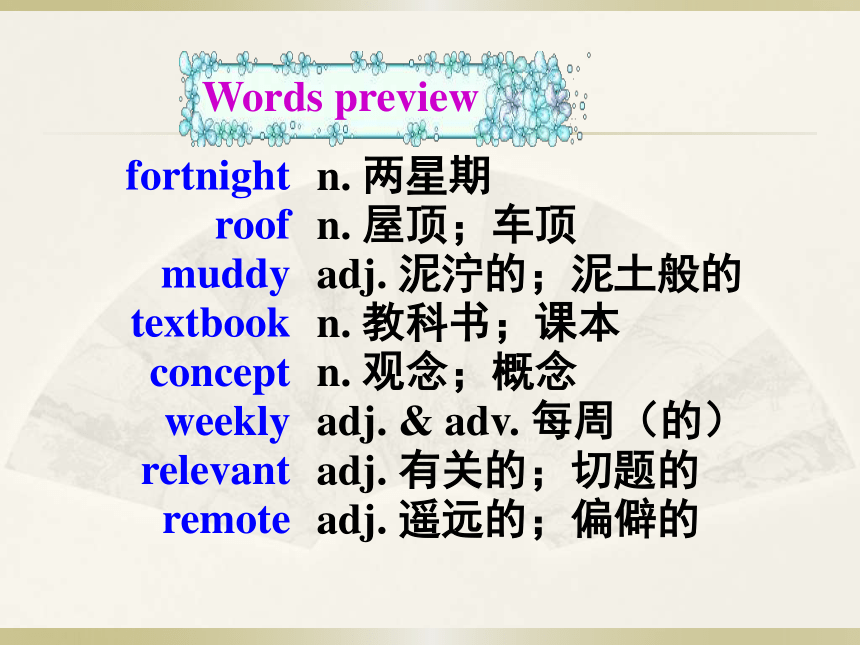
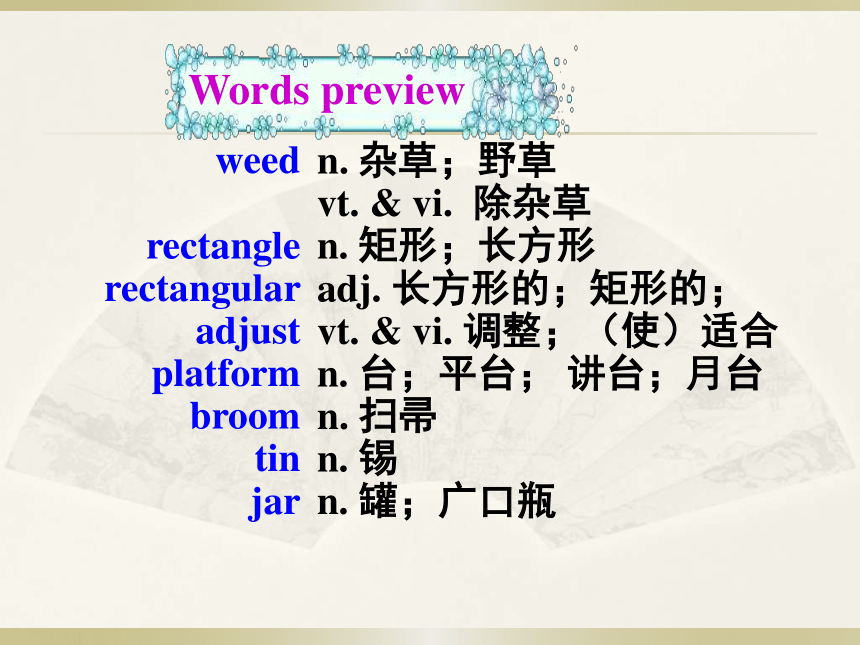
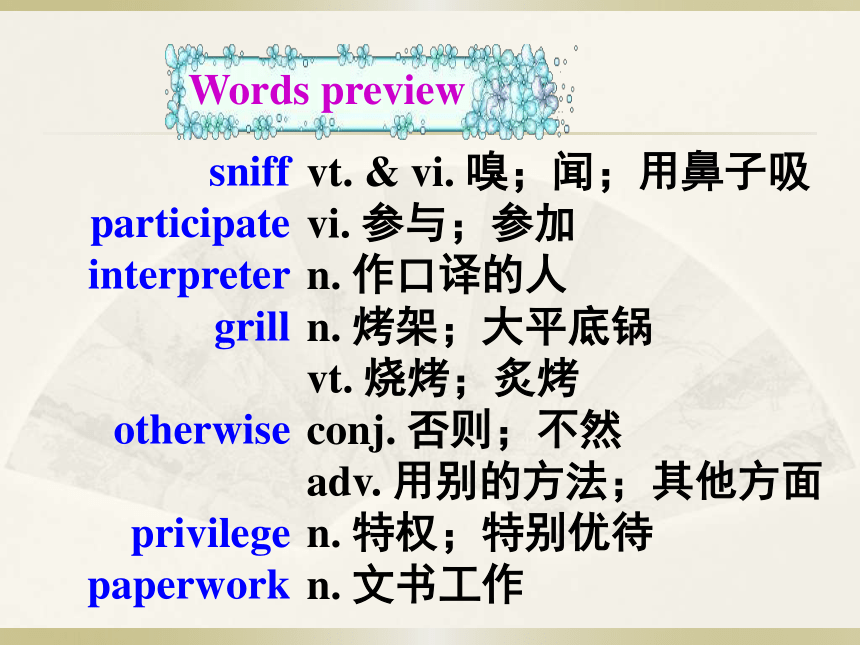
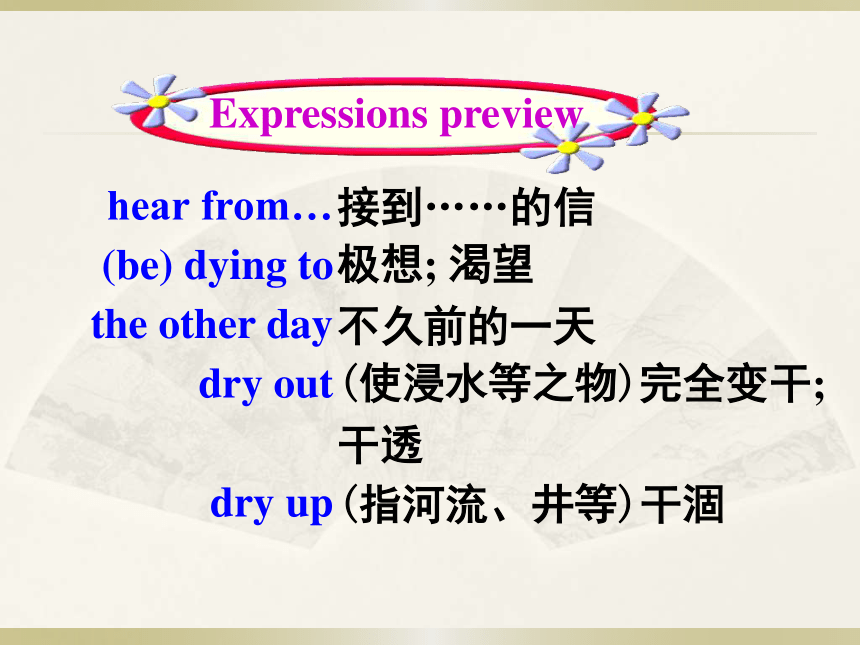

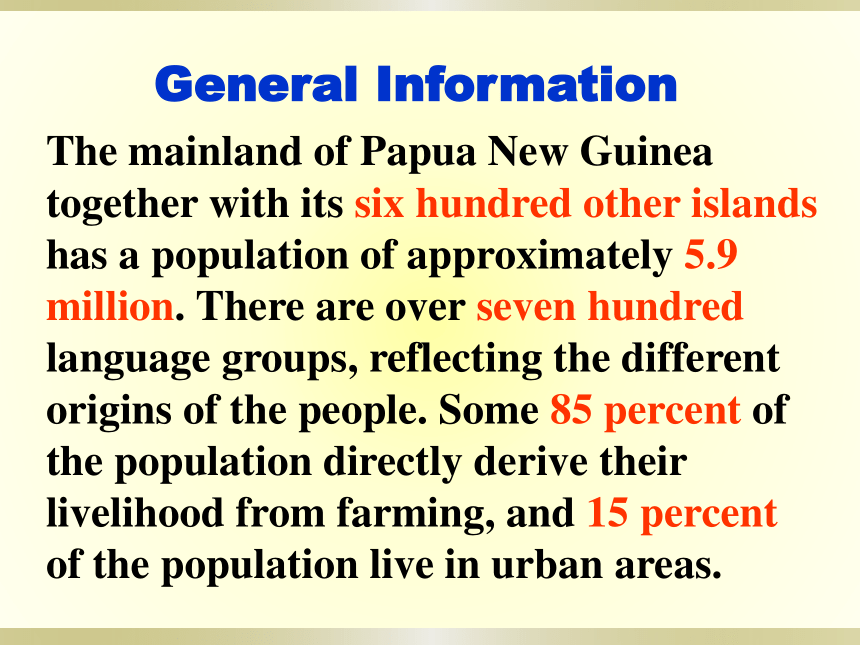


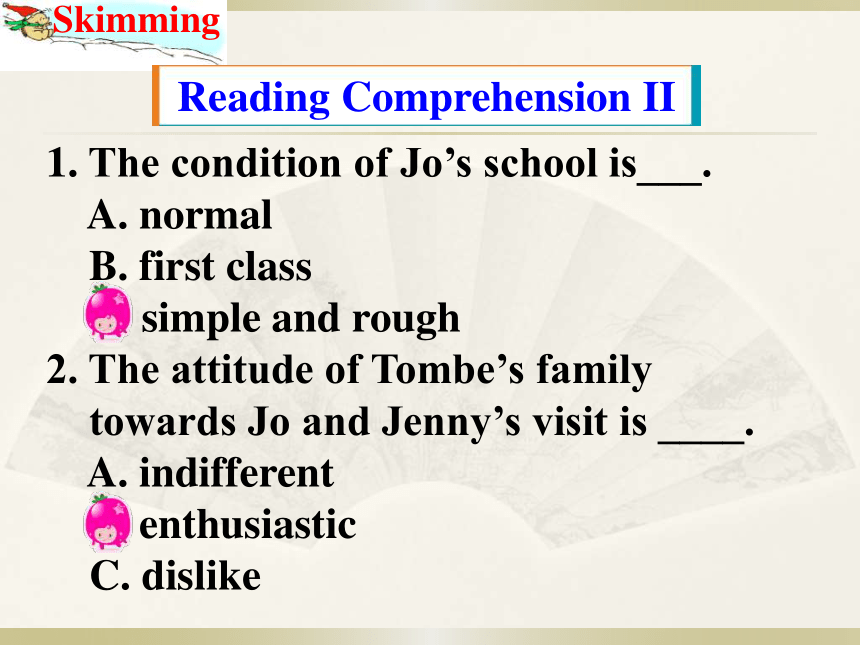

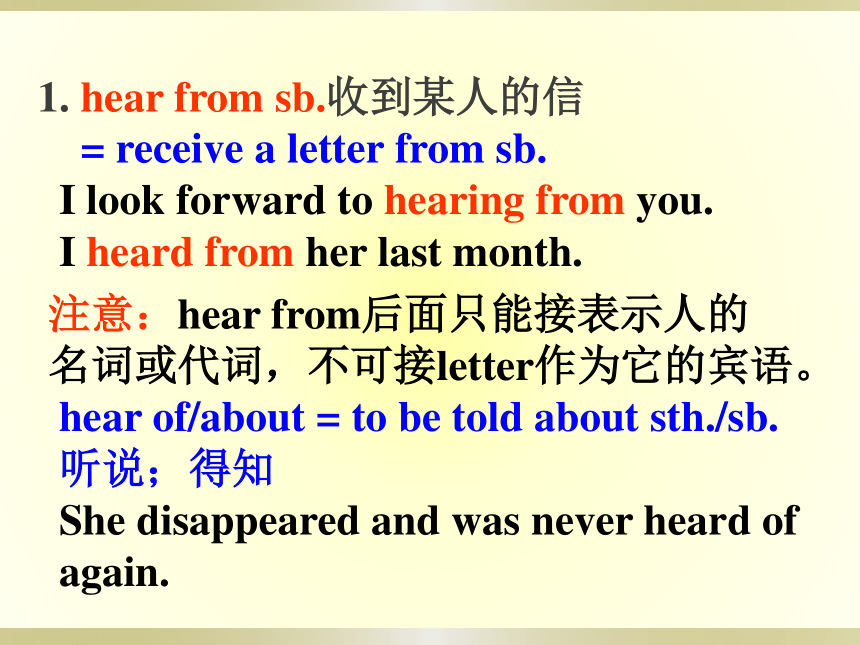
文档简介
课件49张PPT。A Letter HomeUnit 4 fortnight
roof
muddy
textbook
concept
weekly
relevant
remoten. 两星期
n. 屋顶;车顶
adj. 泥泞的;泥土般的
n. 教科书;课本
n. 观念;概念
adj. & adv. 每周(的)
adj. 有关的;切题的
adj. 遥远的;偏僻的Words preview weed
rectangle
rectangular
adjust
platform
broom
tin
jarn. 杂草;野草
vt. & vi. 除杂草
n. 矩形;长方形
adj. 长方形的;矩形的;
vt. & vi. 调整;(使)适合
n. 台;平台; 讲台;月台
n. 扫帚
n. 锡
n. 罐;广口瓶Words preview sniff
participate
interpreter
grill
otherwise
privilege
paperworkvt. & vi. 嗅;闻;用鼻子吸
vi. 参与;参加
n. 作口译的人
n. 烤架;大平底锅
vt. 烧烤;炙烤
conj. 否则;不然
adv. 用别的方法;其他方面
n. 特权;特别优待
n. 文书工作Words previewhear from…
(be) dying to
the other day
dry out
dry up接到……的信
极想; 渴望
不久前的一天
(使浸水等之物)完全变干;
干透
(指河流、井等)干涸Expressions previewIndependent State of Papua New Guinea The mainland of Papua New Guinea together with its six hundred other islands has a population of approximately 5.9 million. There are over seven hundred language groups, reflecting the different origins of the people. Some 85 percent of the population directly derive their livelihood from farming, and 15 percent of the population live in urban areas. General InformationSkimming
to get
general ideasSkimmingReading Comprehension IWhat’s the main idea of the text?Jo wrote a letter to her friend Rosemary to talk about her experience as a volunteer teacher in Papua New Guinea. SkimmingReading Comprehension II The condition of Jo’s school is___.
A. normal
B. first class
C. simple and rough
2. The attitude of Tombe’s family
towards Jo and Jenny’s visit is ____.
A. indifferent
B. enthusiastic
C. dislikeCareful reading
to solve
difficult points hear from sb.收到某人的信
= receive a letter from sb.
I look forward to hearing from you.
I heard from her last month. 注意:hear from后面只能接表示人的
名词或代词,不可接letter作为它的宾语。
hear of/about = to be told about sth./sb.
听说;得知
She disappeared and was never heard of
again.与hear 相关的短语:
hear about 听到关于......的消息
hear from 收到……的来信
hear of 听说, 听到
hear sb. do sth. 听见某人做了某事
hear sb. doing sth. 听见某人正在做某事
2. be dying to do / for sth.
渴望做某事;迫切想要
She is dying to go abroad.
I'm dying for a glass of water.(1) 我极想出国。______________________I am dying to go abroad.(2) 他很渴望喝点酒。______________________________He was dying for a little wine.3. relevant (adj) → relevantly (adv)
“有关的;有实际价值(重要性)的”
反义词 :irrelevant
★ be relevant to “与……有关”
= be connected with
have sth to do with
这种工作与性别无关 。
The work of this kind is not relevant to sex.4. adjust vi. & vt. 调整;使适合
adjust the watch 把表拨准
adjust the errors 校正误差
Can you adjust it?
你可不可以把它调整一下?
Please adjust the volume.
那么就请您调一下音量吧。
adjust oneself to... 使自己适应…… adapt &adjust
※ adapt (oneself) to 适应; 适合
You should adapt yourself to the new environment. 你应该适应新环境。
adjust 适应; 调整; 调节; 使之适应
※ adjust (oneself) to =adapt (oneself) to
适应
He adjusted his tie before entering the hall.5. dry adj. 干燥的
vt. 使……变干; 把……弄干
dry out= become/make dry
(使) 变干; 干透
Water the plant regularly, never
letting the soil dry out.
经常给植物浇水,别让土壤干透了。dry up (of rivers, lakes, etc.) become completely dry (河流等)干涸;(使)枯竭
The writer's long separation from social
life dried up his imagination.
长期脱离社会生活使这位作家的想象力枯竭了。太阳很快就会把马路晒干了。
____________________________The sun will soon dry up the roads.Find the main idea of each partTry to divide it into four parts, and summarize what each part is about. Part 1 (Paragraph 1):Part 2 (Paragraphs 2-3):Part 3 (Paragraphs 4-8):Part 4 (Paragraph 9):Jo’s school and her teaching work.Jo’s visit to Tombe’s home in the village.Introducing the topic — Jo’s life in PNG.Part 1 (Paragraph 1):Part 2 (Paragraphs 2-3):Part 3 (Paragraphs 4-8):Part 4 (Paragraph 9):End of the letter.Scanning
to get
detail informationComplete the sentences with the characters
mentioned in the letter: __________ was dying to hear all about
Jo’s life in Papua New Guinea.
2. ________ walked a long way to get to the school .
3. ______________ didn’t have any textbooks.
4. ________ started jumping out of the
windows during a chemistry experiment.RosemaryThe boysThe boys and JoscanningReading Comprehension IIIThe boys5. ____________ visited a village that was
the home of one of the boys, Tombe.
6. _______ started crying “ieee ieee” to
welcome them.
7. _______ led us to a low bamboo hut.
8. ______ was going to share the platform
with Jenny and Jo.
9. ______________ softly talked to each
other in their language Jo didn’t
understand.Jenny and JoKiakMukapKiakTombe’s familyl. Why does Jo call the school where she
teaches a bush school?
A. Because the school was built in a bush.
B. Because the classrooms are made from
bamboo and the roofs from grass.
C. Because there is nothing but bush
around the school.
D. Because students in that school use
"bush" as their names.scanningReading Comprehension IV2. Which of the following statements is true?
A. There is no electricity but enough
water at school.
B. I can become used to the school' s
condition easily.
C. The students there often do chemistry
experiments.
D. We have neither textbooks nor any
experiment equipment. 3. Which of the following sentences is
wrong about Mukap' s house?
A. There were no windows and the
doorway was just big enough to get
through.
B. The hut was dark inside so it took
time for our eyes to adjust.
C. Fresh grass had been laid on the floor
but there was an old platform.
D. There was a fireplace in the centre of
the hut near the doorway.Read Jo's letter again and look at her photos. Then complete the table below.scanningReading Comprehension VSmall, round, made of bamboo, grass roofs; men’s huts have grass sticking out of the top of the roof, no windows (men and women have separate huts); small doorway, floor covered with fresh grassSweet potato, corn, greens, banana leaves, peanutsLarge extended families (Everyone seemed to be a relative of Tombe’s.)Not many-one broom, a few tin plates and cups, a couple of potsHot stones are placed in an oil drum, then vegetables are placed in the drum, covered with banana leaves and steamed.Tools are very basic eg a
digging stick.
(there is no machinery.)A new sleeping platform for the guests, Kiak usually slept in her own hutThe villagers believe in evil spirits. They believe that leftover food attracts evil spirits so they dry it out in a can over the fire. Then the can is thrown out of the hut.Find or guess the reasons for three facts
according to Jo’s letter.scanningReading Comprehension VIBecause they were frightened; they had never seen anything
like it before.Because most of them would live all their lives as farmers.It was her way to welcome visitors to the village and she drew everyone’s attention to their arrival.Perhaps it’s because that was a man’s house.The tin can was used to dry out the leftover food, which might attract evil spirits, so the tin can was thrown out of the hut. What do you think are the positive and negative things about living in a village in Papua New Guinea? Give your reasons. The first one is done for you.scanningReading Comprehension VII1. Would you like to go to a school like
the one described in the letter? Give
reasons.
2. What are the differences between the
school you go to and the one described
in the letter?Discuss3. Jo felt it was a privilege to have spent a
day with Tombe’s family. If you were Jo
how do you think you would have felt?
Give reasons.
4. Why do you think Jo became a volunteer
in PNG? Give as many possible reasons
as you can. Would you like to work as a
volunteer in a poor area? Why?QuizTranslationQuiz I 1 I’ve included some photos __________
______________(能够帮助你想象出)
the places I talk about.
2 The boys _________________________
______________________(以前从来没
有见过这种情况) started jumping out
of the windows. who had never come across
anything like this before which will
help you picture高考链接1. Those successful deaf dancers think
that dancing is an activity _____ sight
matters more than hearing.
(2007 天津)
A. when B. whose
C. which D. where Quiz II 2. Today, we’ll discuss a number of cases
_____ beginners of English fail to use
the language properly.(2007 陕西)
A. which B. as C. why D. where
3. —Where did you get to know her?
—It was on the farm _______ we worked.
(2007 山东)
A. that B. there C. which D. where 4. The road conditions there turned out
to be very good, ___ was more than
we could expect. (2008 全国卷II)
A. it B. what
C. which D. that
5. Later in this chapter cases will be
introduced to readers __ consumer
complaints have resulted in changes in
the law. (2008 江西卷)
A. where B. when
C. who D. which6. For many cities in the world, there is no
room to spread out further, ____ New
York is an example. (2008 四川卷)
A. for which B. in which
C. of which D. from which
7. The growing speed of a plant is
influenced by a number of factors, ____
are beyond our control. (2008 湖南卷)
A. most of them B. most of which
C. most of what D. most of that Homework 1. Read the passage again after class and find all the attributive clauses in it.
2. Write a letter to your friend to talk about your experience as a volunteer in about 150 words.Thank you.
roof
muddy
textbook
concept
weekly
relevant
remoten. 两星期
n. 屋顶;车顶
adj. 泥泞的;泥土般的
n. 教科书;课本
n. 观念;概念
adj. & adv. 每周(的)
adj. 有关的;切题的
adj. 遥远的;偏僻的Words preview weed
rectangle
rectangular
adjust
platform
broom
tin
jarn. 杂草;野草
vt. & vi. 除杂草
n. 矩形;长方形
adj. 长方形的;矩形的;
vt. & vi. 调整;(使)适合
n. 台;平台; 讲台;月台
n. 扫帚
n. 锡
n. 罐;广口瓶Words preview sniff
participate
interpreter
grill
otherwise
privilege
paperworkvt. & vi. 嗅;闻;用鼻子吸
vi. 参与;参加
n. 作口译的人
n. 烤架;大平底锅
vt. 烧烤;炙烤
conj. 否则;不然
adv. 用别的方法;其他方面
n. 特权;特别优待
n. 文书工作Words previewhear from…
(be) dying to
the other day
dry out
dry up接到……的信
极想; 渴望
不久前的一天
(使浸水等之物)完全变干;
干透
(指河流、井等)干涸Expressions previewIndependent State of Papua New Guinea The mainland of Papua New Guinea together with its six hundred other islands has a population of approximately 5.9 million. There are over seven hundred language groups, reflecting the different origins of the people. Some 85 percent of the population directly derive their livelihood from farming, and 15 percent of the population live in urban areas. General InformationSkimming
to get
general ideasSkimmingReading Comprehension IWhat’s the main idea of the text?Jo wrote a letter to her friend Rosemary to talk about her experience as a volunteer teacher in Papua New Guinea. SkimmingReading Comprehension II The condition of Jo’s school is___.
A. normal
B. first class
C. simple and rough
2. The attitude of Tombe’s family
towards Jo and Jenny’s visit is ____.
A. indifferent
B. enthusiastic
C. dislikeCareful reading
to solve
difficult points hear from sb.收到某人的信
= receive a letter from sb.
I look forward to hearing from you.
I heard from her last month. 注意:hear from后面只能接表示人的
名词或代词,不可接letter作为它的宾语。
hear of/about = to be told about sth./sb.
听说;得知
She disappeared and was never heard of
again.与hear 相关的短语:
hear about 听到关于......的消息
hear from 收到……的来信
hear of 听说, 听到
hear sb. do sth. 听见某人做了某事
hear sb. doing sth. 听见某人正在做某事
2. be dying to do / for sth.
渴望做某事;迫切想要
She is dying to go abroad.
I'm dying for a glass of water.(1) 我极想出国。______________________I am dying to go abroad.(2) 他很渴望喝点酒。______________________________He was dying for a little wine.3. relevant (adj) → relevantly (adv)
“有关的;有实际价值(重要性)的”
反义词 :irrelevant
★ be relevant to “与……有关”
= be connected with
have sth to do with
这种工作与性别无关 。
The work of this kind is not relevant to sex.4. adjust vi. & vt. 调整;使适合
adjust the watch 把表拨准
adjust the errors 校正误差
Can you adjust it?
你可不可以把它调整一下?
Please adjust the volume.
那么就请您调一下音量吧。
adjust oneself to... 使自己适应…… adapt &adjust
※ adapt (oneself) to 适应; 适合
You should adapt yourself to the new environment. 你应该适应新环境。
adjust 适应; 调整; 调节; 使之适应
※ adjust (oneself) to =adapt (oneself) to
适应
He adjusted his tie before entering the hall.5. dry adj. 干燥的
vt. 使……变干; 把……弄干
dry out= become/make dry
(使) 变干; 干透
Water the plant regularly, never
letting the soil dry out.
经常给植物浇水,别让土壤干透了。dry up (of rivers, lakes, etc.) become completely dry (河流等)干涸;(使)枯竭
The writer's long separation from social
life dried up his imagination.
长期脱离社会生活使这位作家的想象力枯竭了。太阳很快就会把马路晒干了。
____________________________The sun will soon dry up the roads.Find the main idea of each partTry to divide it into four parts, and summarize what each part is about. Part 1 (Paragraph 1):Part 2 (Paragraphs 2-3):Part 3 (Paragraphs 4-8):Part 4 (Paragraph 9):Jo’s school and her teaching work.Jo’s visit to Tombe’s home in the village.Introducing the topic — Jo’s life in PNG.Part 1 (Paragraph 1):Part 2 (Paragraphs 2-3):Part 3 (Paragraphs 4-8):Part 4 (Paragraph 9):End of the letter.Scanning
to get
detail informationComplete the sentences with the characters
mentioned in the letter: __________ was dying to hear all about
Jo’s life in Papua New Guinea.
2. ________ walked a long way to get to the school .
3. ______________ didn’t have any textbooks.
4. ________ started jumping out of the
windows during a chemistry experiment.RosemaryThe boysThe boys and JoscanningReading Comprehension IIIThe boys5. ____________ visited a village that was
the home of one of the boys, Tombe.
6. _______ started crying “ieee ieee” to
welcome them.
7. _______ led us to a low bamboo hut.
8. ______ was going to share the platform
with Jenny and Jo.
9. ______________ softly talked to each
other in their language Jo didn’t
understand.Jenny and JoKiakMukapKiakTombe’s familyl. Why does Jo call the school where she
teaches a bush school?
A. Because the school was built in a bush.
B. Because the classrooms are made from
bamboo and the roofs from grass.
C. Because there is nothing but bush
around the school.
D. Because students in that school use
"bush" as their names.scanningReading Comprehension IV2. Which of the following statements is true?
A. There is no electricity but enough
water at school.
B. I can become used to the school' s
condition easily.
C. The students there often do chemistry
experiments.
D. We have neither textbooks nor any
experiment equipment. 3. Which of the following sentences is
wrong about Mukap' s house?
A. There were no windows and the
doorway was just big enough to get
through.
B. The hut was dark inside so it took
time for our eyes to adjust.
C. Fresh grass had been laid on the floor
but there was an old platform.
D. There was a fireplace in the centre of
the hut near the doorway.Read Jo's letter again and look at her photos. Then complete the table below.scanningReading Comprehension VSmall, round, made of bamboo, grass roofs; men’s huts have grass sticking out of the top of the roof, no windows (men and women have separate huts); small doorway, floor covered with fresh grassSweet potato, corn, greens, banana leaves, peanutsLarge extended families (Everyone seemed to be a relative of Tombe’s.)Not many-one broom, a few tin plates and cups, a couple of potsHot stones are placed in an oil drum, then vegetables are placed in the drum, covered with banana leaves and steamed.Tools are very basic eg a
digging stick.
(there is no machinery.)A new sleeping platform for the guests, Kiak usually slept in her own hutThe villagers believe in evil spirits. They believe that leftover food attracts evil spirits so they dry it out in a can over the fire. Then the can is thrown out of the hut.Find or guess the reasons for three facts
according to Jo’s letter.scanningReading Comprehension VIBecause they were frightened; they had never seen anything
like it before.Because most of them would live all their lives as farmers.It was her way to welcome visitors to the village and she drew everyone’s attention to their arrival.Perhaps it’s because that was a man’s house.The tin can was used to dry out the leftover food, which might attract evil spirits, so the tin can was thrown out of the hut. What do you think are the positive and negative things about living in a village in Papua New Guinea? Give your reasons. The first one is done for you.scanningReading Comprehension VII1. Would you like to go to a school like
the one described in the letter? Give
reasons.
2. What are the differences between the
school you go to and the one described
in the letter?Discuss3. Jo felt it was a privilege to have spent a
day with Tombe’s family. If you were Jo
how do you think you would have felt?
Give reasons.
4. Why do you think Jo became a volunteer
in PNG? Give as many possible reasons
as you can. Would you like to work as a
volunteer in a poor area? Why?QuizTranslationQuiz I 1 I’ve included some photos __________
______________(能够帮助你想象出)
the places I talk about.
2 The boys _________________________
______________________(以前从来没
有见过这种情况) started jumping out
of the windows. who had never come across
anything like this before which will
help you picture高考链接1. Those successful deaf dancers think
that dancing is an activity _____ sight
matters more than hearing.
(2007 天津)
A. when B. whose
C. which D. where Quiz II 2. Today, we’ll discuss a number of cases
_____ beginners of English fail to use
the language properly.(2007 陕西)
A. which B. as C. why D. where
3. —Where did you get to know her?
—It was on the farm _______ we worked.
(2007 山东)
A. that B. there C. which D. where 4. The road conditions there turned out
to be very good, ___ was more than
we could expect. (2008 全国卷II)
A. it B. what
C. which D. that
5. Later in this chapter cases will be
introduced to readers __ consumer
complaints have resulted in changes in
the law. (2008 江西卷)
A. where B. when
C. who D. which6. For many cities in the world, there is no
room to spread out further, ____ New
York is an example. (2008 四川卷)
A. for which B. in which
C. of which D. from which
7. The growing speed of a plant is
influenced by a number of factors, ____
are beyond our control. (2008 湖南卷)
A. most of them B. most of which
C. most of what D. most of that Homework 1. Read the passage again after class and find all the attributive clauses in it.
2. Write a letter to your friend to talk about your experience as a volunteer in about 150 words.Thank you.
